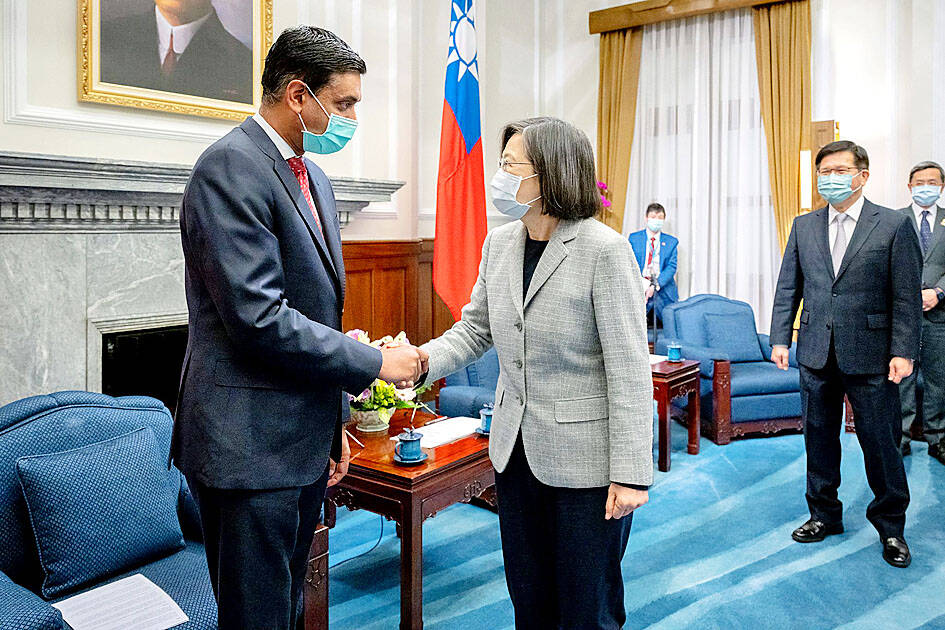Taiwan plans to boost military exchanges with the US to curb authoritarian expansionism, President Tsai Ing-wen (蔡英文) said yesterday after meeting with visiting US lawmakers.
The five-day US congressional visit comes after a top US defense official reportedly made a stopover in Taiwan.
“Taiwan and the United States continue to bolster military exchanges,” Tsai said after meeting with the delegation at the Presidential Office Building in Taipei. “Going forward, Taiwan will cooperate even more actively with the United States and other democratic partners to confront such global challenges as authoritarian expansionism and climate change.”

Photo: AFP / Taiwan Presidential Office
Tsai did not provide further details on what the future exchanges might entail.
It is time “to explore even more opportunities for cooperation” between the US and Taiwan, Tsai said.
“Together we can continue to safeguard the values of democracy and freedom,” she added.
Taiwan and the US should “leverage their respective strengths and together build more resilient technology industrial chains,” Tsai said, adding that the two countries have collaborated on semiconductors, 5G communications and renewable energy sources under bilateral science and technology initiatives.
US Representative Ro Khanna, a member of the newly created US House of Representatives committee on strategic competition with the Chinese Communist Party, said he was leading the bipartisan delegation’s visit to expand “the partnership on military and defense,” and to shore up ties with the nation’s world-leading semiconductor industry.
Established last month, the select committee is tasked with investigating issues related to US economic and security competition with China and making policy recommendations.
“We are here to affirm the shared values between the United States and Taiwan, a commitment to democracy, a commitment to freedom,” Khanna said yesterday.
He “particularly appreciated” a meeting on Monday with Taiwan Semiconductor Manufacturing Co (台積電) founder Morris Chang (張忠謀), Khanna said.
Also in the delegation, which arrived in Taiwan on Sunday for a five-day visit, are US representatives Jake Auchincloss — a member of the select committee — Jonathan Jackson and Tony Gonzales.
Beijing, which claims Taiwan as part of its territory and has vowed to seize it one day, opposes any official exchanges with the democracy and has reacted with anger to a flurry of trips to the island by US politicians in recent years.
Chinese Ministry of Foreign Affairs spokesman Wang Wenbin (汪文斌) yesterday accused Taiwanese leaders of “provocation,” saying that “any futile separatist conspiracy or scheme relying on foreign forces to undermine cross-strait relations will only backfire and never succeed.”
Taiwanese authorities “cannot change the inevitable broader trend toward Chinese unification,” Wang told a regular news conference.
Additional reporting by CNA

NATIONAL SECURITY THREAT: An official said that Guan Guan’s comments had gone beyond the threshold of free speech, as she advocated for the destruction of the ROC China-born media influencer Guan Guan’s (關關) residency permit has been revoked for repeatedly posting pro-China content that threatens national security, the National Immigration Agency said yesterday. Guan Guan has said many controversial things in her videos posted to Douyin (抖音), including “the red flag will soon be painted all over Taiwan” and “Taiwan is an inseparable part of China,” while expressing hope for expedited “reunification.” The agency received multiple reports alleging that Guan Guan had advocated for armed reunification last year. After investigating, the agency last month issued a notice requiring her to appear and account for her actions. Guan Guan appeared as required,

A Vietnamese migrant worker yesterday won NT$12 million (US$379,627) on a Lunar New Year scratch card in Kaohsiung as part of Taiwan Lottery Co’s (台灣彩券) “NT$12 Million Grand Fortune” (1200萬大吉利) game. The man was the first top-prize winner of the new game launched on Jan. 6 to mark the Lunar New Year. Three Vietnamese migrant workers visited a Taiwan Lottery shop on Xinyue Street in Kaohsiung’s Gangshan District (崗山), a store representative said. The player bought multiple tickets and, after winning nothing, held the final lottery ticket in one hand and rubbed the store’s statue of the Maitreya Buddha’s belly with the other,

‘NATO-PLUS’: ‘Our strategic partners in the Indo-Pacific are facing increasing aggression by the Chinese Communist Party,’ US Representative Rob Wittman said The US House of Representatives on Monday released its version of the Consolidated Appropriations Act, which includes US$1.15 billion to support security cooperation with Taiwan. The omnibus act, covering US$1.2 trillion of spending, allocates US$1 billion for the Taiwan Security Cooperation Initiative, as well as US$150 million for the replacement of defense articles and reimbursement of defense services provided to Taiwan. The fund allocations were based on the US National Defense Authorization Act for fiscal 2026 that was passed by the US Congress last month and authorized up to US$1 billion to the US Defense Security Cooperation Agency in support of the

CLASSIFIED BRIEFING: The ministry said the special budget focuses on building a comprehensive defense system and strengthening the domestic defense industry The Ministry of National Defense yesterday released information on seven categories of weapons systems to be procured under a stalled NT$1.25 trillion (US$39.57 billion) special defense budget, including precision artillery, long-range missiles, air defense anti-tank missiles and more than 200,000 uncrewed aerial vehicles (UAVs). The Executive Yuan approved a draft version of the budget on Nov. 27 last year and submitted it to the legislature for review. The legislature’s Foreign Affairs and National Defense Committee yesterday invited Minister of National Defense Wellington Koo (顧立雄) to deliver a classified briefing and answer questions at a closed-door session. Koo said he hoped to provide lawmakers